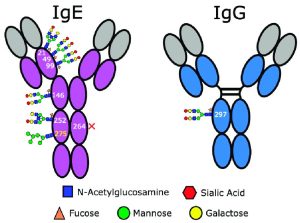Summary written by Alicia Chenoweth, PhD, King’s College London; Image from Ref. 7.
Antibody Engineering & Therapeutics, held in December 2022, offered many opportunities to hear exciting and informative presentations by experts in the field, including Professor Sophia Karagiannis from King’s College London, who discussed “IgE Class Antibody Immunotherapy for Solid Tumours”.
Although IgE is notorious for its role in allergic pathogenesis and anti-parasitic immune responses, there is increasing evidence that IgE may also play a role in protection against cancer. IgE deficiency is associated with increased risk of cancer, while higher total serum IgE levels may be protective against certain forms of cancer [1]. Thus, IgE biology may be of interest to cancer therapy. There are many desirable properties of IgE over the traditionally used IgG for cancer therapeutics, such as engaging powerful FceR receptors that are not shared with other classes of Ig, a very high-affinity for its high-affinity receptor FceRI which removes the need for immune complex formation allowing lower-expressing antigens to be targeted, high tissue penetration and persistence (around 1-2 weeks half-life in tissues, compared to a few days for IgG), and the lack of inhibitory receptors.
For IgE therapies, it is important to select a target which is highly expressed in tumor tissue and lowly expressed in normal tissues to enhance safety, as well as making sure that the antigen is not shed in large, multivalent formats in the circulation. Folate receptor alpha (FRa) was selected as a potential target for IgE immunotherapy, as it is overexpressed in several solid tumors, including ovarian cancer, basal breast cancer, and mesotheliomas, while also demonstrating low expression in normal tissues by transcriptomic and immunohistochemical studies [2]. An anti-FRa antibody that had already been in clinical trials and showed safety and efficacy as an IgG format was selected to engineer into an IgE format.


